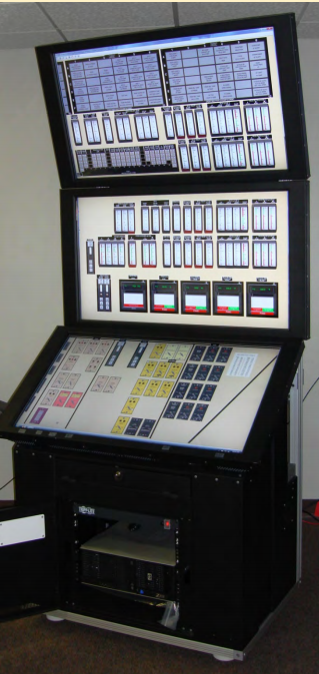Representative End User Clients


Representative Automation Clients
Representative Software Clients
 rotate from field to console operation so they can work better as a team. The training needed for the field operator is different than the training needs for the control system console operator. Imagine for example the situation at Fukushima where they lost outside power and had a station blackout. Once batteries died the control room went black and the console operators were blind to the sensors. Once the control system lost power the field devices go to their fail safe condition. Now all operators were essentially
rotate from field to console operation so they can work better as a team. The training needed for the field operator is different than the training needs for the control system console operator. Imagine for example the situation at Fukushima where they lost outside power and had a station blackout. Once batteries died the control room went black and the console operators were blind to the sensors. Once the control system lost power the field devices go to their fail safe condition. Now all operators were essentially field operators and without station power they have many problems to solve. When operators are presented with unusual events where situational awareness is hard to realize and prompt actions are urgent, stress leads to indecision and judgement errors. While Nuclear Plant operators did have training for abnormal situations, accidents like Fukushima show the training weaknesses. In April 2015 the NRC responded to lessons learned from Fukushima and issued Mitigating Strategies (EA-12-049) and these strategies include improvements in “Emergency Procedures” that require training improvements. Japanese nuclear operators have increased the use of training simulators. The field operator should know the physical spacial geometry of the process. Where all the vessels, valves, pumps, motors, switches, and gauges are at. In many cases the field operator needs to use local control panels for special equipment like compressors or packaged machinery. Simulators can include "Glass Panel" (Southern Company) simulations like the panel at the right to emulate local control panels. Simulation suppliers are developing industrial versions of 3D immersive training simulators by using virtual reality software and hardware. Many developments for industry simulators come from PC video games, with powerful rendering engines, graphics cards, game controllers, and virtual reality headsets. The army is increasingly using virtual reality for infantry training using multiplayer game technology with individuals operating their own avatars. A host of new technologies using LIDAR or simple photos are making it easier than ever to build a 3D models for brownfield industrial facilities. With a decent 3D model of your plant, and 3D animated icons and avatars, creating a virtual training simulation program for field operators is easier than ever. Several vendors dynamically connect the 3D virtual simulation to the more traditional process simulation used by the console operators. In this arrangement, training programs can involve multiple field operators interacting with the control room operators using walkie-talkies to accomplish a highly realistic start-up or to handle an accident. Suppliers are making this technology available for industrial training, and the new breed of millennial operators are often comfortable with this gaming technology. ARC believes the suppliers have lit the match. It will be interesting to see if this new 3D training simulation technology will catch fire in industry. It could soon find a place in industrial training programs where it can improve training effectiveness. What could be better than training your operators with traditional methods like training videos, SOP's, classroom training, and on-the-job training? The answer is training them with a modern operator training simulation and a well planned training program. Learn more about the market for 3D immersive simulators and training for control room operators from the recently released ARC study on Operator Training Simulators or the associated Technology and Supplier Selection Guide.
field operators and without station power they have many problems to solve. When operators are presented with unusual events where situational awareness is hard to realize and prompt actions are urgent, stress leads to indecision and judgement errors. While Nuclear Plant operators did have training for abnormal situations, accidents like Fukushima show the training weaknesses. In April 2015 the NRC responded to lessons learned from Fukushima and issued Mitigating Strategies (EA-12-049) and these strategies include improvements in “Emergency Procedures” that require training improvements. Japanese nuclear operators have increased the use of training simulators. The field operator should know the physical spacial geometry of the process. Where all the vessels, valves, pumps, motors, switches, and gauges are at. In many cases the field operator needs to use local control panels for special equipment like compressors or packaged machinery. Simulators can include "Glass Panel" (Southern Company) simulations like the panel at the right to emulate local control panels. Simulation suppliers are developing industrial versions of 3D immersive training simulators by using virtual reality software and hardware. Many developments for industry simulators come from PC video games, with powerful rendering engines, graphics cards, game controllers, and virtual reality headsets. The army is increasingly using virtual reality for infantry training using multiplayer game technology with individuals operating their own avatars. A host of new technologies using LIDAR or simple photos are making it easier than ever to build a 3D models for brownfield industrial facilities. With a decent 3D model of your plant, and 3D animated icons and avatars, creating a virtual training simulation program for field operators is easier than ever. Several vendors dynamically connect the 3D virtual simulation to the more traditional process simulation used by the console operators. In this arrangement, training programs can involve multiple field operators interacting with the control room operators using walkie-talkies to accomplish a highly realistic start-up or to handle an accident. Suppliers are making this technology available for industrial training, and the new breed of millennial operators are often comfortable with this gaming technology. ARC believes the suppliers have lit the match. It will be interesting to see if this new 3D training simulation technology will catch fire in industry. It could soon find a place in industrial training programs where it can improve training effectiveness. What could be better than training your operators with traditional methods like training videos, SOP's, classroom training, and on-the-job training? The answer is training them with a modern operator training simulation and a well planned training program. Learn more about the market for 3D immersive simulators and training for control room operators from the recently released ARC study on Operator Training Simulators or the associated Technology and Supplier Selection Guide. 
